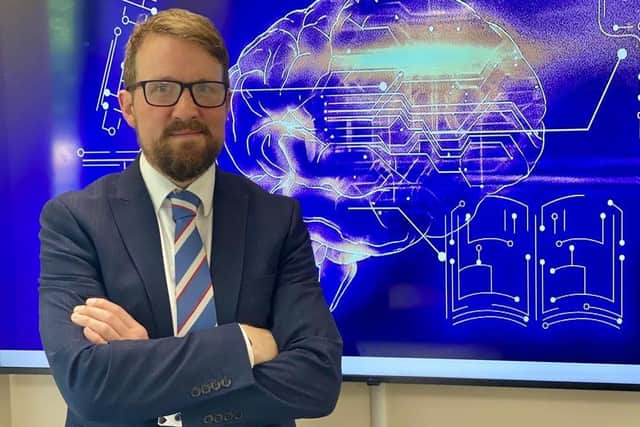How AI is going to change teaching and learning in classrooms - Michael Spiers
It was a cold February morning when I first became engaged in a conversation about AI, Scribbling down the name ChatGPT on a piece of paper, I took my first tentative steps into the world of AI.
My first experiments were centred on the abstract and the ridiculous.
Advertisement
Hide AdAdvertisement
Hide AdAs weeks passed, I started to discuss the AI revolution with students. An AI photograph has been awarded first place in a global photography competition and an AI song featuring two leading artists has been removed from Spotify after being downloaded one million times. Students have a keen understanding of its uses, and this has implications for homework and assessments.


A third of the students I spoke to were aware of ChatGPT and when SnapChat decided to embed their own AI chatbot in the app, the audience was widened and students became even more attached to the world of AI. Through conversations with learned colleagues, I was able to share thoughts and ideas as to how we could utilise AI in our teaching to benefit students and what we needed to be aware of regarding the implications of student AI usage.
We established a group of interested teachers, from a range of departments, many of whom were far more au fait in the use of AI than I was, all keen to stay ahead of the curve while contributing to the vital conversation about the role of AI in secondary school teaching
Alongside collaborating to develop best practices and strategies we are discussing and evaluating the potential drawbacks and ethical concerns associated with AI in education. This area is already subject to extensive discussion at university and in many schools.
Advertisement
Hide AdAdvertisement
Hide AdRecent developments in AI prompt pertinent questions relating to work undertaken outside the control of a classroom setting, and schools, exam boards and other parties grapple with what it all means for the future.
According to Professor Geoffrey Hinton, the ‘Godfather of AI’ who left Google partly to warn of the dangers of AI, recent developments have seen a pace of advancement that he and others had not anticipated.
In an interview with the Guardian, Professor Hinton dismissed the idea propagated by some that AI is a fad that will pass. Using a bell curve for probability, he suggests that the smallest impact AI will have is akin to that of the smartphone, the likelihood is a fundamental shift in employment around the world necessitating great societal change and an awareness of potentially destabilising state actors seeking to use AI to manipulate the news.
Now seemingly ever present in the news, AI will change all our lives to different degrees.
Advertisement
Hide AdAdvertisement
Hide AdAs teachers we can take advantage of amazing innovations to aid teaching and learning. AI can aid us in undertaking certain administration tasks, allowing us to focus on teaching, learning and pastoral support. Over the course of the next few years the landscape of education will change in a fundamental manner, requiring an evolution of thinking and a great adaptability. It will be an interesting journey.
Michael Spiers is a teacher at Ripon Grammar School.